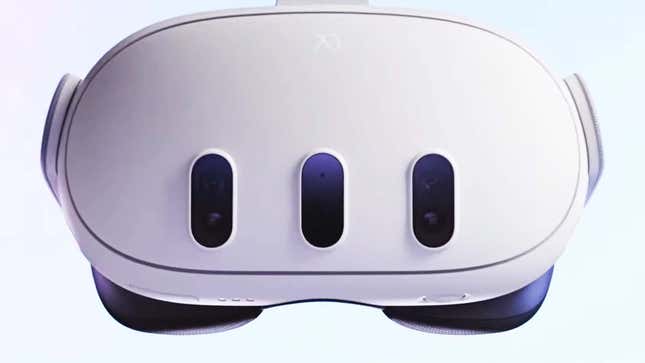
Facebook, I mean, Meta, has officially announced the long-rumored Quest 3, its next virtual reality headset. The Quest 3, the successor to the most popular VR headset so far, will be out later this year starting at $500.
The Quest and later the Quest 2 were both positioned as affordable ways to enter the wild world of virtual reality gaming and entertainment. And for the most part, both devices nailed that objective, providing a relatively cheap, easy-to-use, and standalone option for folks looking to experience VR gaming without wanting to buy into PlayStation VR or an expensive VR-capable PC. But the Quest 2 is nearly three years old—ancient in the tech world—so here comes the Quest 3 from Meta.
Officially announced Thursday, the upcoming VR device will be more powerful than a Quest 2. Meta claims the newer Snapdragon chip powering the device will have twice the GPU capability of the old Quest 2. Thanks to the new pancake lens optics, first seen in last year’s Quest Pro, it also will be about 40 percent smaller than Quest 2, which was already reasonably compact. The Quest 3 will also feature a higher-resolution display and much higher-quality passthrough cameras. Now in color and assisted with a special depth sensor, they’ll let users better see the real world around them without having to take off their headset and open the door to more sophisticated mixed-reality experiences.
The Quest 3 will also feature a new iteration on the Quest hand controllers, which are now less bulky thanks to the removal of the tracking rings. One seeming downside is that they are still only tracked by the base headset instead of having self-tracking like the Pro’s more advanced controllers, so it’s likely they’ll still have issues getting “lost” when you move your hands behind your back, etc. (Quest 3 is compatible with the Quest Pro controllers if you want to pay for that upgrade, though.) Also in are new haptics, to better convey physical sensations. Finally, the Quest 3 will be able to directly track your hands for controller-free play, a feature that only worked modestly on the prior headset. Hopefully it’s better now.
Of course, all this extra power and performance won’t come cheap. The Meta Quest 3, which is planned to launch later this year, will start at $500 for 128GB storage, with a 256GB version costing more. Now, on the one hand, that is $50 cheaper than a PS VR2 headset, which is not standalone and requires a PlayStation 5. However, the upcoming Quest 3 headset will still cost $200 more than the Quest 2’s original MSRP of $300. But compared to Meta’s $1000 Quest Pro headset, the $500 Quest 3 feels like a bargain.
Meta continues to burn money trying to make the metaverse
While Meta continues to announce virtual reality projects and products, the company is struggling to make any money off this stuff. In 2022 alone the company’s VR division lost over $13 billion. And many of its projects, like its own take on a metaverse, have flopped and failed to connect with users. Even Meta’s own staff reportedly doesn’t use its struggling virtual reality-powered meeting and productivity apps.
But hey, Mark Zuckerberg is really convinced the future involves all of us strapping expensive headsets to our faces so we can walk around in virtual offices and get yelled at by digital bosses while we dream about spending our weekends in ugly virtual reality rooms with strangers who won’t stop invading our personal space. So, Zuck’s going to keep throwing money at VR and the metaverse, no matter how much it fails or how many people he has to lay off in the process.
One good thing that has come from this mess is the Quest 2, the first affordable mass-market VR headset. And soon, we’ll have what sounds like a pretty reasonable, if pricier, successor.
.